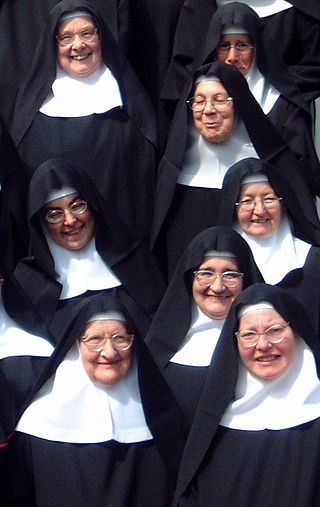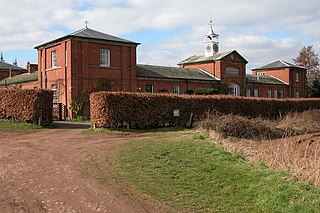The Society of the Sacred Advent is an Anglican religious order founded at Brisbane, Queensland, Australia, in 1892 by Caroline Amy Balguy (1833-1915), and still active in that city.
The Society of the Sacred Advent is an Anglican religious order founded at Brisbane, Queensland, Australia, in 1892 by Caroline Amy Balguy (1833-1915), and still active in that city.
Known as Sister Caroline Amy and, later, Mother Caroline, Caroline Amy Balguy started her religious life at the Community of St John Baptist in Clewer, England. She came to Australia on 9 December 1892 at the request of the Reverend Montagu John Stone-Wigg, Vicar and Canon Residentiary of St John’s Pro-Cathedral, who saw the need for an Anglican religious order for women in Brisbane. [1]
In its early days the Society of the Sacred Advent focused on ministering to the needs of women and children, establishing several schools and children’s homes throughout Queensland. In 1895 the Sisters opened a boarding school for girls in Nundah, at the site of a former boys' school, known as Eton High School. [2] On 8 July 1910, under the guidance of Mother Emma Crawford, the Sisters moved into their current residence at Community House in Albion.
As expressed on the Anglican Religious Communities website, The Society of the Sacred Advent exists "for the glory of God and for the service of His Church in preparation for the Second Coming of our Lord and Saviour Jesus Christ". [3] To this end, the Sisters devote themselves to God in community under vows of poverty, chastity and obedience, leading a life of prayer, silence and work. The Sisters' aim is "to point the way to Jesus in our own time, to a world which has largely lost touch with spiritual realities and is caught up in despair, loneliness and fear". [3] The patron saint of the order is St John the Baptist.
The Society has two schools located in Brisbane, Australia - St Margaret's and St Aidan's; both are for girls only. Although the Sisters are no longer involved in the day-to-day running of the schools, two Sisters remain active on each of the School Councils. The Sisters also conduct regular quiet days and retreats which are open to members of the public. Attendees can enjoy a day of quiet prayer in the Sister's Chapel and the beautiful gardens surrounding Community House. A traditional labyrinth is also available for use. Details for quiet days and retreats may be found in 'Focus', the newspaper of the Anglican Diocese of Brisbane.
In recent years, the Society has received two new vocations; Sister Rosalind Miriam was admitted as a novice in 2007, and Sister Moira Grace in 2006. [4] Sister Moira has since taken full vows at a ceremony held in the Sister's Chapel on 26 February 2008; and Sister Rosalind Miriam most recently on 2 February 2010. On 11 July 2010, the Sisters also celebrated 100 years in their current residence, Community House.
In 2017, the Sisters celebrated 125 years since the establishment of their Society. Of the approximately 80 women who joined the order, only 3 sisters remain, living in semi-retirement. The Society still owns St Margaret's and St Aidan's schools in Brisbane. Other schools established by the order are now managed by the relevant Anglican diocese. [5]

A nun is a woman who vows to dedicate her life to religious service and contemplation, typically living under vows of poverty, chastity, and obedience in the enclosure of a monastery or convent. The term is often used interchangeably with religious sisters who do take simple vows but live an active vocation of prayer and charitable work.

Sandgate is a northern coastal suburb in the City of Brisbane, Queensland, Australia. In the 2021 census, Sandgate had a population of 4,926 people.

Nundah is an inner suburb in the City of Brisbane, Queensland, Australia. It contains the neighbourhood of Toombul. In the 2016 census, Nundah had a population of 12,141 people.

The Society of Saint Francis (SSF) is an international Franciscan religious order within the Anglican Communion. It is the main recognised Anglican Franciscan order, but there are also other Franciscan orders in the Anglican Communion.

Corinda is a suburb in the City of Brisbane, Queensland, Australia. In the 2016 census, Corinda had a population of 5,064 people.

Anglican religious orders are communities of men or women in the Anglican Communion who live under a common rule of life. The members of religious orders take vows which often include the traditional monastic vows of poverty, chastity and obedience, or the ancient vow of stability, or sometimes a modern interpretation of some or all of these vows. Members may be laity or clergy, but most commonly include a mixture of both. They lead a common life of work and prayer, sometimes on a single site, sometimes spread over multiple locations. Though many Anglicans are members of religious orders recognized by the Anglican Communion, others may be members of ecumenical Protestant or Old Catholic religious orders while maintaining their Anglican identity and parochial membership in Anglican churches.

St Margaret's Anglican Girls School is an Australian private Anglican day and boarding school for girls. The school is located in Ascot, an inner-northern suburb of Brisbane, Queensland.
Mundingburra is a suburb of Townsville in the City of Townsville, Queensland, Australia. In the 2016 census, Mundingburra had a population of 3,620 people.

The Queensland Girls' Secondary Schools Sports Association Inc (QGSSSA) is a sporting association for girls from eight private girls' schools, one co-educational private school, and one co-educational public school, based in Brisbane, Queensland, Australia. Established in 1908 as the Secondary Schools Sports Association, inter-school competition commenced in 1909 in the sports of Swimming, Tennis and Basket Ball. Competition is offered to, and organised for, girls from Years 7 to 12.

St Aidan's Anglican Girls' School is an independent, Anglican, day school for girls, located in Corinda, a western suburb of Brisbane, Queensland, Australia. It was named after Aidan of Lindisfarne, an Irish saint.
The Society of Saint Margaret (SSM) is an order of women in the Anglican Church. The religious order is active in England, Haiti, Sri Lanka, and the United States and formerly Scotland.
Emma Crawford was a teacher and mother superior of the Sisters of the Sacred Advent in Queensland, Australia.

Rangeville is a residential locality in Toowoomba in the Toowoomba Region, Queensland, Australia. In the 2021 census, Rangeville had a population of 8,668 people.
Former religious orders in the churches of the Anglican Communion are those communities of monks, nuns, friars, or sisters, having a common life and rule under vows, whose work has ended and whose community has been disbanded. In a very few cases this is due to the termination of the work for which the community was established, but in most cases it is due to amalgamation or the death of the final remaining member of the community.
The Alliance of Girls' Schools Australasia is a non-profit organisation that promotes the education of girls in single-sex girls' schools, and promotes the image of, and support the development of, girls' schools in Australasia.
David Thomas is a judge of the Federal Court of Australia and a former justice of the Supreme Court of Queensland in the Trial Division. He was appointed to the Supreme Court on 17 September 2013 and to the Federal Court on 27 June 2017. He served as the president of the Administrative Appeals Tribunal from the date of his appointment to the Federal Court until 31 January 2022. Prior to his appointment to the AAT he was the president of the Queensland Civil and Administrative Tribunal.
The Community of the Ascension was an Anglican religious community for men in Goulburn, New South Wales, Australia. It was the first male Anglican religious order to be successfully established in Australia, in 1921, and existed until it dissipated in 1940 and then formally dissolved in 1943.
The Community of the Holy Name (CHN) is an Anglican religious community for women in the Melbourne suburb of Cheltenham, Victoria, Australia. In 1912 it became the first Anglican religious order to be successfully established in Australia, although the founders established a community in 1888 from which date the community traces its origins. It is unrelated to the English Community of the Holy Name.